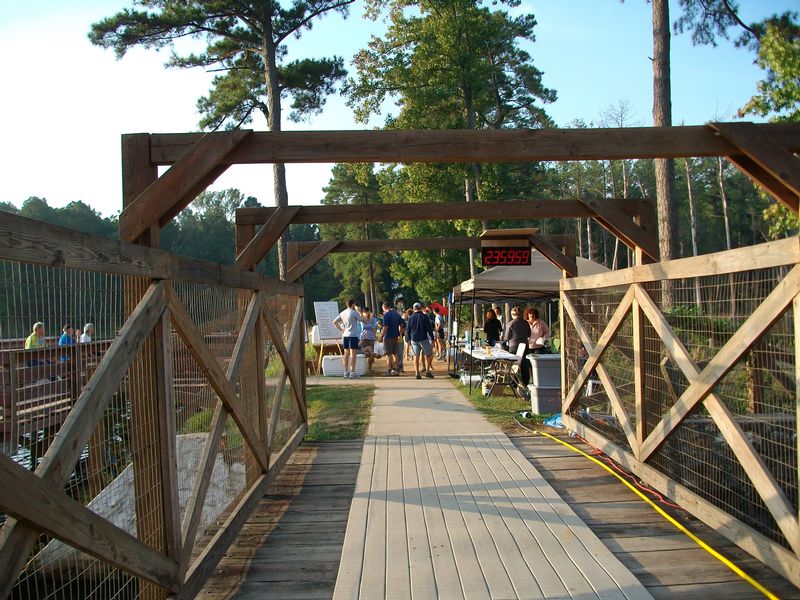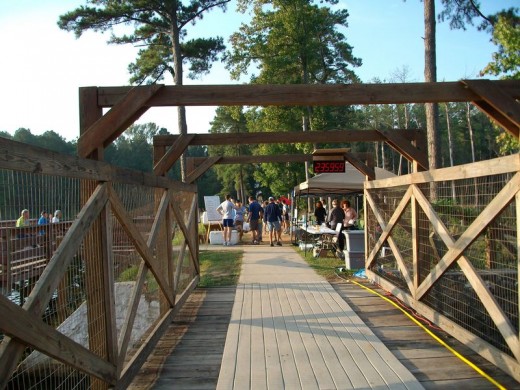I ran an ultra. This is what I learned.

A couple Saturdays ago I went down to Hinson Lake in Rockingham, North Carolina, and ran around it 21 times. At 1.52 miles per lap, that comes to a total of 31.96, which is just above a 50k, the common distance for an ultra marathon. So, I ran an ultra and that makes me an ultra marathoner. Yay. It also gave me a lot of time to learn a few things that can help church planters and other people crazy enough to take on big dreams.
The official results listed me at 20 laps, but it’s all good since I know what I did and confirmed it on each lap with the scorers and my Garmin.
LESSON 1: The bigger the goal, the longer the training.
I learned this lesson from my baby sister, Mary, who decided to run her first 5k the same time I ran my first 5k a handful of years ago. I had followed a 9-week training program called “Couch To 5k” and when I told her the week before the race that I was running it, she said she’d run it with me even though she hadn’t trained at all. The result? We both finished. The point? That only works on shorter distances, and only if you don’t want to do the best you can.
Can you imagine the result if Mary – or anyone else – tried to pull that off in a half marathon, a full marathon, or an ultra? Disaster, and more than likely an injury and failure. Bigger races demand lengthier training, and it’s the same with goals in life, too. You just can’t pull off big dreams without advanced planning. Big goals are like big planes: they both need long runways to get off the ground, so plan, prepare, and then enjoy the payoff at the right time.
LESSON 2: The bigger the goal, the slower you go.
I would never want to say that pace doesn’t matter, but when you’re running an ultra, pace doesn’t really matter. In fact, when I told most people that I’d run 32 miles, very few of them asked me how long it took. Most of them responded with, “You ran how far???”
Short distances can be covered quickly, but trying to run an ultra at 5k pace will kill you and ensure that you don’t run much more than a 5k. So slow down. Stop being in such a hurry and take the time to enjoy the journey. Sometimes at The Gathering where I pastor, I feel the pressure that we should be moving faster, but the truth is that we’re 2 years old, and like any 2 year old who is trying to learn how to walk, we’re going to fall down a lot and stagger like a drunken sailor. But thankfully, we’re also cute and people take lots of pictures. It’s all part of the journey, and when you have a long view, it’s easier to stay in for the long haul. Impatient people don’t run ultras, and if you’ve got big dreams, impatience will kill them faster than any other obstacle you face.
LESSON 3: Small things get bigger over the long run.
I’ve run a number of short races like 5ks and 8ks and I’ve never once stopped in the middle of one of them to pull my shoe off and remove a pebble, stick or rock. Why not? Because I can endure just about anything for 20-30 minutes. But if you don’t give your attention to the little things that start to rub at mile 3 in an ultra, then chances are pretty good that you’ve got a blister, or chaffing, or worse by mile 15.
I heard about a study that was done once in order to determine what separated the good CEOs from the really great ones, and the number one difference maker was how quickly (or slowly) they dealt with personnel problems. As a pastor, I am in a fraternity of other leaders who typically deal way too slowly with issues that only become bigger the longer they’re ignored. So it’s much better to take the time to stop what you’re doing and deal with the issue. If you feel like you don’t have the time to do that, re-read Lesson 2 and slow down. Don’t sacrifice the long term vision for some short term peace. Chaffing is real and it hurts, both physically and spiritually, so if you feel some resistance, take the time to heal. Paying attention to the little things in a timely manner can keep them from growing into bigger things down the road.
LESSON 4: You can be tired and finish, but you can’t be stopped and finish.
I was tired when I finished, and many times was tired before I finished. And as much as others will make you feel like what you’re trying to do should look easy, that’s a lie. Big goals demand big efforts, and big efforts tire us out. Period.
If you’ve been working on a goal that’s bigger than you – whether in ministry or business – then you need to understand that the sheer magnitude of the dream is enough to wear you out, and that’s not even taking into account the actual DOING of the dream. Stop being surprised that you’re tired, and start finding ways to catch a break here and there so that you can refuel and jump right back in the race. The key to ultras is a simple statement that I have found is quite common among ultra runners: keep moving forward. That’s it. No one expects you to breeze across the finish line looking like a movie star who just stepped out of a salon. The honor is in the fight, the perseverance, and the flat out, no quit attitude that refuses to stop moving. The only way to not finish is to stop moving, so don’t stop. You have more in you than you think, and if you’re a follower of Jesus like I am, then you DEFINITELY have more in you than you think because of His power.
Maybe you’ve run an ultra or accomplished a big goal, too. What lessons have you learned along the way? Why not share them in the comments so that others can benefit from them, too?







Leave a Comment